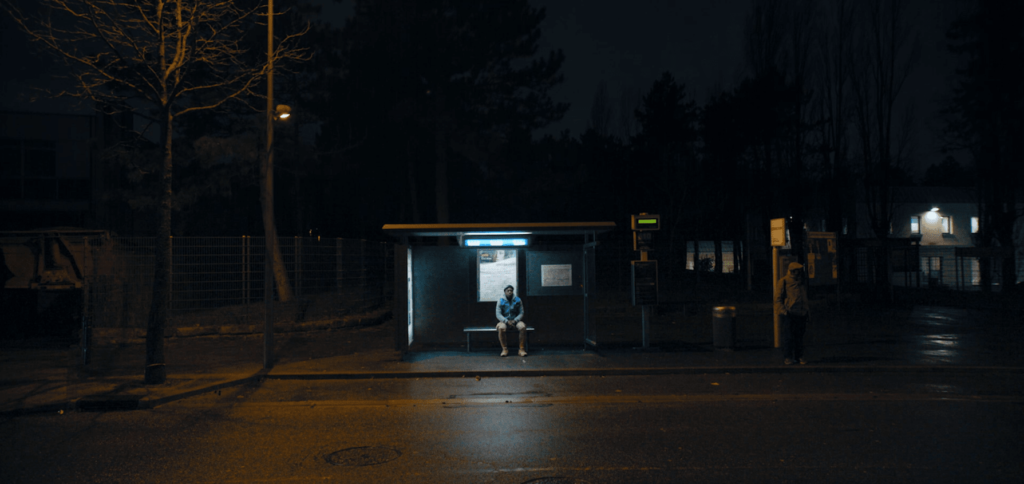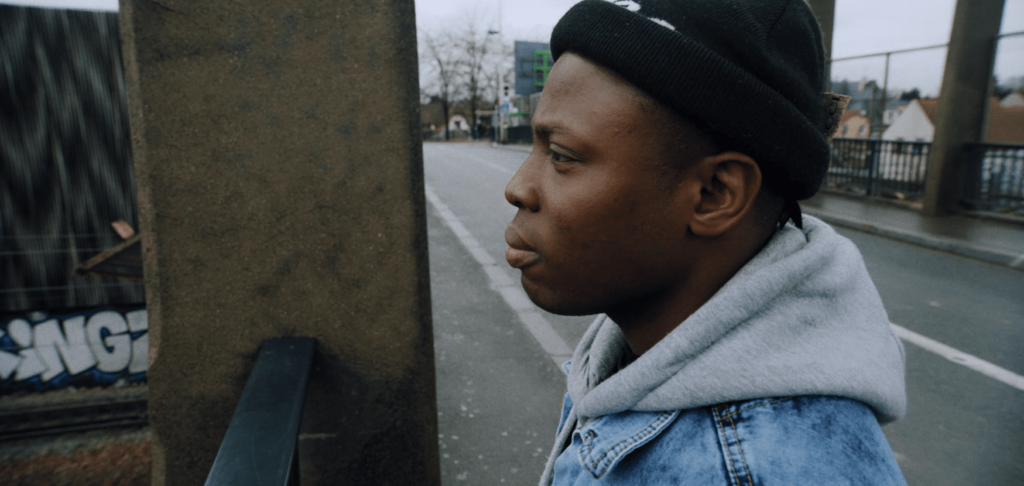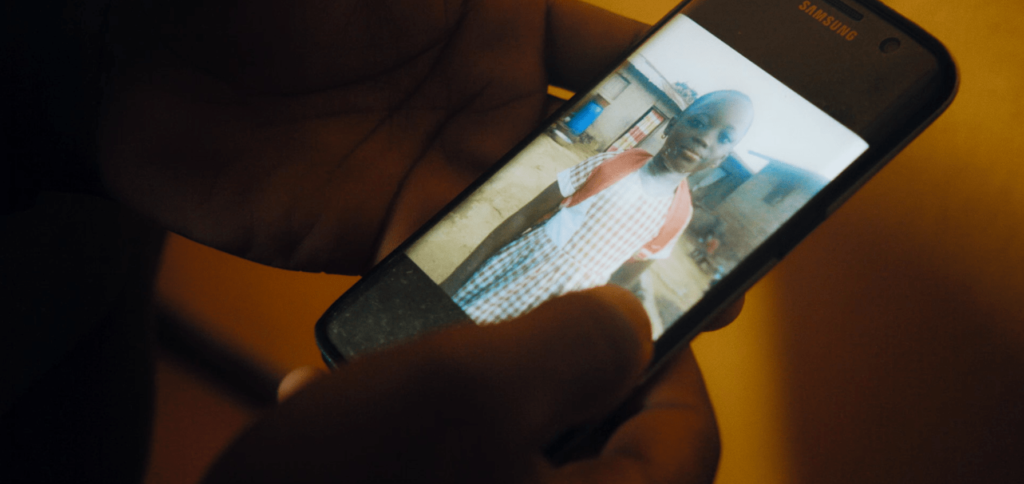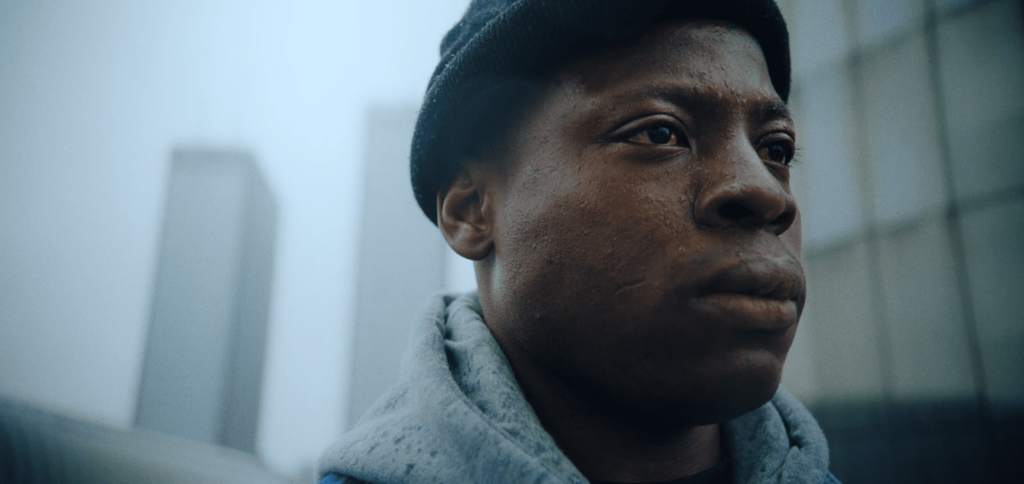“When the boat capsized, I told myself: ‘I ran away from death and… I’m dying here, like this?'”
Fleeing threats of murder, Mamadou embarked on what African migrants call ‘The Adventure’. He left Ivory Coast behind him, crossed the Sahara and Mediterranean, lost friends along the way, and was robbed of self-worth.
Now an unofficial refugee in France, he scrapes by on odd jobs. He plays football, and dances, to forget. But there is no forgetting his daughter Naomi, who stayed home. Mamadou clings to hope they will find each other again, one day.
Directed by Loïc Phil
Photography: Thierry Le Mer
First assistant camera: Rémi Delvern
Sound: Alexandre Bracq
Edited by Loïc Phil, Simon Philippe
Assistant editor: Arthur Ducoux
Colour grading: Eudes Quitellier
Music: Loïc Phil (Ilhoë)
Souder mixer: Timotée Pédron
Additional music: Meiway – « Miss Lolo » (J.P.S. Production)
Translation: Djénébou Diabaté
Interview

Loïc Phil
Filmmaker
“It’s the story of a man constantly struggling
with the shadows of his past
and hanging on to hope for the future.”
- How was this film conceived?
At first, the idea was to blend a short documentary of the important social stakes with a deliberate staging. I just couldn’t avoid looking at migration as a subject. I met Mamadou through the non-profit organization Autremonde (Otherworld), based in the 20th arrondissement in Paris. Their mandate is to build up social solidarity and support for people living on the edge. They put me in touch with Mamadou, who’d taken part in a dance performance the year before, and we hit it off.

- Since Mamadou isn’t in the country legally, he could be deported at any time. How come he agreed to let you tell his story, showing his face at the risk of being identified? Was it hard to convince him and film him?
Mamadou knew the risks of showing his face, but he really wanted to tell his story, for people who have had the same sort of experience, and for others. We quickly agreed that we’d make this film hand in hand; that he would tell his story and I’d be the faithful messenger, relaying the story from my point of view. This process was indispensable, because it left Mamadou the freedom to express himself at the same time as getting involved in a project with purpose.
The risk of being deported was a major drawback in making the documentary. If there’d been a single police ID check, that would have been the end for Mamadou, so we had to be smart. A camera in the street really tends to catch people’s attention, likewise the police. So we had to learn how to avoid being stopped, keeping our distance from certain places, and working with a small crew. It wasn’t easy, but the filming went well. For us, that was just a tiny taste of what undocumented immigrants go through every day.
Mamadou and I are still in touch, and he’s still in France. When COVID lockdowns are lifted, the plan is to present the film in several places, together!

- We get the impression that this film changed shape while you were making it. At first, we think it’s going to be about dance, and it turns into the story of a man who’s suffering and losing hope.
You’re right! It was supposed to revolve around dance and zouglou (‘90s music from Ivory Coast). But the more time I spent with Mamadou, the deeper his story got. It was more complicated and powerful than I thought. So, pretty fast, the story morphed into something enigmatic, around his thought process and the road he’d taken.
I’d say that the central theme is how heavily a person’s past weighs on his present. Our baggage of the past skews our entire life in the present. We carry this stuff around with us the whole time, and this is what we have to build with. ‘Djao’ is the story of a man constantly struggling with the shadows of his past and hanging on to hope for the future.
“My generation learned how to make movies
by shooting videos
with our friends on weekends.”
- It’s a beautiful film you’ve made, with an exquisite sense of light, filmed up close, with movement. How did you come at this stylistically?
Thanks! I’ve always believed that, to deliver the substance of a film, the form is extremely important. What makes cinema stand out is being able to use photography and music to tell a story in such a way as to stir emotions. I’m sincerely convinced that it’s the emotional momentum that drives the audience to feel what the film is about, and not just understand it on a rational level. You can only really comprehend a subject, a situation, a condition, by way of that emotional layer, that wash of sensations overlaid on the rational layer. Because of that, you have to take intense care of the form you give the film, to make it more than a display case, to make it an effective vehicle that delivers meaning.
In real-world terms, that means getting your photography right. I talked this over a lot with Thierry Le Mer, Director of Photography, about how the film should look. We talked about how we might blend great-looking images with situations of inner feeling. We had to use pretty heavy equipment in places where the camera had to be able to go everywhere, but without being too obtrusive. We also had to keep the shooting schedule as short as possible, to stay within our equipment budget. The immersive experience that we got out of this in large part was thanks to the relationship of trust that we built up with Mamadou. He was very generous, the way he let us into his life.

- You seem to be involved in everything — you direct clips and advertisements, documentaries, fictional features. How do you keep so many balls in the air?
My generation learned how to make movies by shooting videos with our friends on weekends. I was fortunate to start earning a living thanks to that a few years ago, in advertising. It’s a great way to learn your way around technically, and a great way to meet people. But I also want to work on my own projects. I’m really interested in all the different kinds of grammar there is (frame, shot, scene, sequence, transition) for each type of film — documentary, fiction, ads, and so on. I like to be able to try my hand at everything, because they don’t all work the same way.
For instance, it’s two very different tasks to create a story out of nothing — create fiction — as opposed to taking on a story that already exists — do a documentary — and express your idea. Both are interesting, and require different methodologies. I like the spontaneity of the documentary form a lot, but I’m still curious about and open to all sorts of projects.
I just wrapped up a short documentary on electro dance with a release date for the start of February 2021. At the same time, I’m developing quite a few different projects that I don’t want to talk about yet; but there’s some neat stuff coming up in 2021!

- The eternal question: how did you fund this film?
I’ve been working with the production company Gump for several years, both on advertising and more personal projects. There’s a lot of mutual appreciation, we enjoy working together. They were with me producing the film ‘As It Blooms’ in 2019, which we filmed in Iran. For ‘Djao’, our goal was to invest time and money in a project we’d be proud to show, as a stepping stone to bigger projects. So, we devoted ourselves to the film without paying too much attention to the quantity of work, while forging a solid, motivated team. That’s how we did it.
- Is there a short documentary you’d recommend?
It has nothing to do with migration, but I love Anderson Wright’s ‘Every Nite Is Emo Nite’. It’s about the last evening of an emo music fan in Los Angeles. I’ve watched this film a lot because it manages to create a lot of emotion in just a few minutes. The director gets us really attached to the main character, and creates empathy for him, so we’re moved by what happens to him.
I find this is an excellent example of what we should look for in a film — more than just approaching the theme, getting us firmly on board; what makes us like the film is simply the empathy that grows for the character. The rest follows. Especially in this film, it’s achieved by a combination of a smart choice of character, beautiful, immersive camera work, and very intelligent editing. It packs a punch, but the film editor knows just how long to let a shot last, to give the spectator time to feel emotionally moved. That makes all the difference in this film, that I’d like to take inspiration from in the future.
- A word about 99, and the multilingual adaptation of your film?
I’m very happy to see ‘Djao’ out in several languages on 99. Also really happy to see Mamadou’s story alongside other people’s stories, whether or not they’re migrants, and also told through different directors’ eyes.
It’s truly great to see that the short documentary can get a foothold on the internet. The format allows things that long form doesn’t: more compact subjects, more outspoken risk-taking. ‘Bravo’ for your outstanding work!
